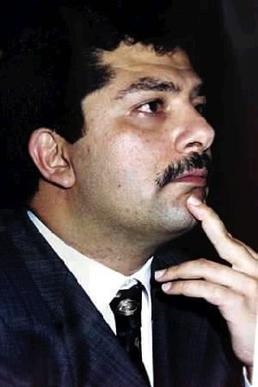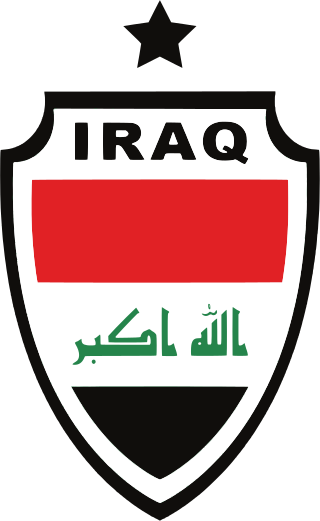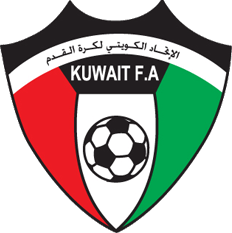Related Research Articles

Qusay Saddam Hussein al-Nasiri al-Tikriti was an Iraqi politician, military leader, and the second son of Saddam Hussein. He was appointed as his father's heir apparent in 2000. He was also in charge of the Republican Guard. Qusay and his brother Uday were killed in a U.S. raid in Mosul.

Saddam Hussein was an Iraqi politician and revolutionary who was the fifth president of Iraq, from 16 July 1979 until 9 April 2003. He also served as prime minister of Iraq, first from 16 July 1979 until 23 March 1991, and later from 29 May 1994 to 9 April 2003. He was a leading member of the revolutionary Arab Socialist Ba'ath Party, and later, the Baghdad-based Ba'ath Party and its regional organization, the Iraqi Ba'ath Party, which espoused Ba'athism, a mix of Arab nationalism and Arab socialism.

The 1st Infantry Division is a combined arms division of the United States Army, and is the oldest continuously serving division in the Regular Army. It has seen continuous service since its organization in 1917 during World War I. It was officially nicknamed "The Big Red One" after its shoulder patch and is also nicknamed "The Fighting First." The division has also received troop monikers of "The Big Dead One" and "The Bloody First" as puns on the respective officially sanctioned nicknames. It is currently based at Fort Riley, Kansas.

ʿAbd al-Salam Mohammed ʿArif al-Jumayli was the second president of Iraq from 1963 until his death in a plane crash in 1966. He played a leading role in the 14 July Revolution, in which the Hashemite monarchy was overthrown on 14 July 1958.

The Iraq national football team represents Iraq in international football and is controlled by the Iraq Football Association (IFA), the governing body for football in Iraq. Iraq's usual home venue is the Basra International Stadium.

The Kuwait national football team is the national team of Kuwait and is controlled by the Kuwait Football Association. Kuwait made one World Cup finals appearance, in 1982, managing one point in the group stages. In the Asian Cup, Kuwait reached the final in 1976 and won the tournament in 1980.

The Yemen national football team represents Yemen in international football. The national team is administered by the Yemen Football Association.

The Kurdistan Regional Government (KRG) is the official executive body of the autonomous Kurdistan Region of northern Iraq.
The FIFA Arab Cup, or simply Arab Cup, is an international association football competition which has been organized by FIFA since 2021, and is contested by the senior men's national teams of the Union of Arab Football Associations (UAFA), the sport's governing body for countries in the Arab world. The current champion is Algeria, which won its first title at the 2021 tournament in Qatar.

The 1966 Syrian coup d'état refers to events between 21 and 23 February during which the government of the Syrian Arab Republic was overthrown and replaced. The ruling National Command of the Arab Socialist Ba'ath Party were removed from power by a union of the party's Military Committee and the Regional Command, under the leadership of Salah Jadid.
Adil Basher, was an Iraqi football player and coach that led Iraq to the 1964 and 1966 Arab Cup.

The Arab Socialist Ba'ath Party, also referred to as the pro-Iraqi Ba'ath movement, is a Ba'athist political party which was headquartered in Baghdad, Iraq until 2003. It is one of two parties which emerged from the 1966 split of the original Ba'ath Party.

The 17 July Revolution was a bloodless coup in Iraq in 1968 led by Ahmed Hassan al-Bakr, Abd ar-Razzaq an-Naif, and Abd ar-Rahman al-Dawud that ousted President Abdul Rahman Arif and Prime Minister Tahir Yahya and brought the Iraqi Regional Branch of the Arab Socialist Ba'ath Party to power. Ba'athists involved in the coup as well as the subsequent purge of the moderate faction led by Naif included Hardan al-Tikriti, Salih Mahdi Ammash, and Saddam Hussein, the future President of Iraq. The coup was primarily directed against Yahya, an outspoken Nasserist who exploited the political crisis created by the June 1967 Six-Day War to push Arif's moderate government to nationalize the Western-owned Iraq Petroleum Company (IPC) in order to use Iraq's "oil as a weapon in the battle against Israel." Full nationalization of the IPC did not occur until 1972, under the Ba'athist administration. In the aftermath of the coup, the new Iraqi government consolidated power by denouncing alleged American and Israeli machinations, publicly executing 14 people including 9 Iraqi Jews on fabricated espionage charges amidst a broader purge, and working to expand Iraq's traditionally close relations with the Soviet Union.

Munif al-Razzaz was a Jordanian-Syrian physician and politician who was the second, and last, Secretary General of the National Command of the Arab Socialist Ba'ath Party, having been elected to the post at the 8th National Congress held in April 1965.
The 1965–66 Iraq Central FA Premier League was the 18th season of the Iraq Central FA League, and the first under the name of Premier League. It kicked off on 15 October 1965 with its last match being held on 2 June 1966.

This is a list of the Lebanon national football team results from 1940 to 1989.
Amer Jameel is a former Iraqi football forward who played for Iraq in 1966. He played in the 1966 Arab Nations Cup.

This is a list of the Iraq national football team results from 1957 to 1969.
Al-Rafidain Sport Club is an Iraqi football team based in Al Diwaniyah, that plays in Iraq Division Two.
